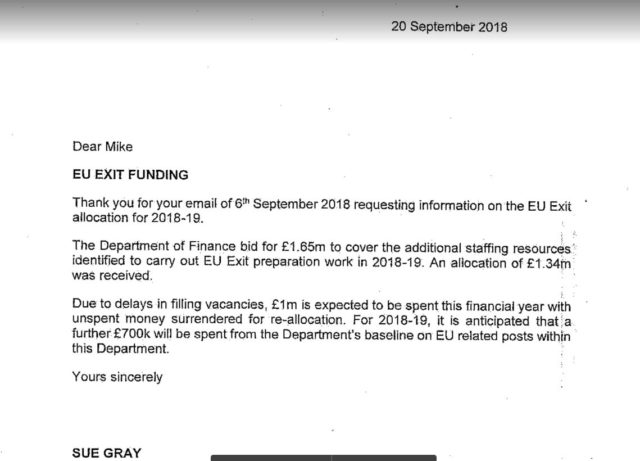
A key Northern Ireland government department is “under-prepared” for Brexit due to delays in recruitment, an Ulster Unionist MLA has claimed.
Mike Nesbitt revealed that the Department of Finance chief has handed back additional money it asked for to prepare for the UK’s departure from the European Union due to delays in filling jobs.
In correspondence with Mr Nesbitt, Sue Gray, Permanent Secretary at the department, said it had applied for £1.65 million to help prepare for Brexit.
The requested money was to help cover additional staffing resources identified to carry out EU exit preparation work in 2018/19.
The department received £1.34 million, but now expects to spend £1 million.
In the correspondence, seen by the Press Association, Ms Gray attributed the underspend to “delays in filling vacancies”.
The unspent money will be surrendered for reallocation.

There are currently no ministers running government departments in Northern Ireland following the suspension of the powersharing government in January 2017.
In the absence of ministers, senior civil servants have had to step in to run departments.
Mr Nesbitt said he is “very concerned” that six months from when the UK is due to leave the EU in March 2019, there appears to be a “significant gap between where we are and where the department clearly wanted to be”.
“While the Executive Office may be the engine room for ideas in our devolved arrangements, the Department of Finance is the beating heart of money management,” he said.
“It has to be assumed therefore that if they bid for £1.65 million to deal with exiting the EU, they need £1.65 million.
“This additional staffing resource was obviously identified because it is required to best understand and manage our needs as we prepare for the greatest shock to our political system since the Second World War, so it is very concerning that six months out from our exit from the European Union there is a significant gap between where we are and where the department clearly wanted to be.”
Mr Nesbitt also queried the delays in filling vacancies against the backdrop of the recent civil service Voluntary Exit Scheme (VES), which was brought in before the collapse of Stormont in January 2017.
“The other key question relates to the fact that the underspend is explained, but not excused, by delays in filling vacancies, thus raising the question of whether the Voluntary Exit Scheme introduced by the last DUP/Sinn Fein coalition created those vacancies in the first place,” he said.
A spokesman for the Department of Finance said: “The Voluntary Exit Scheme concluded in May 2016 before the European Union Membership Referendum on June 23 2016.
“The preparations for EU Exit emerged after the Voluntary Exit Scheme it is not possible to determine if the VES has had any impact on the number of vacancies.”


Comments: Our rules
We want our comments to be a lively and valuable part of our community - a place where readers can debate and engage with the most important local issues. The ability to comment on our stories is a privilege, not a right, however, and that privilege may be withdrawn if it is abused or misused.
Please report any comments that break our rules.
Read the rules here